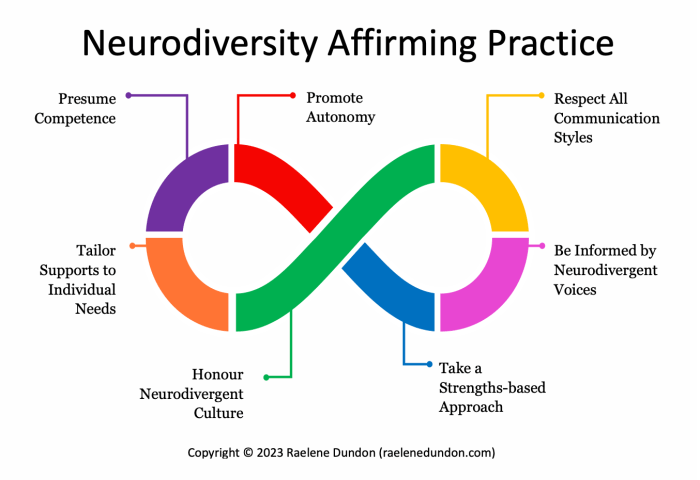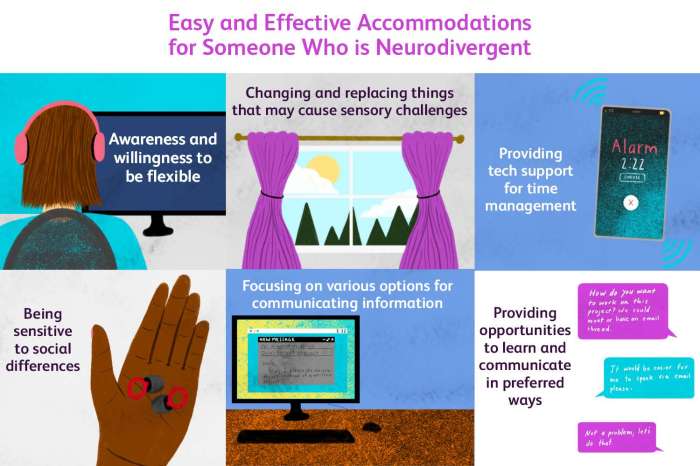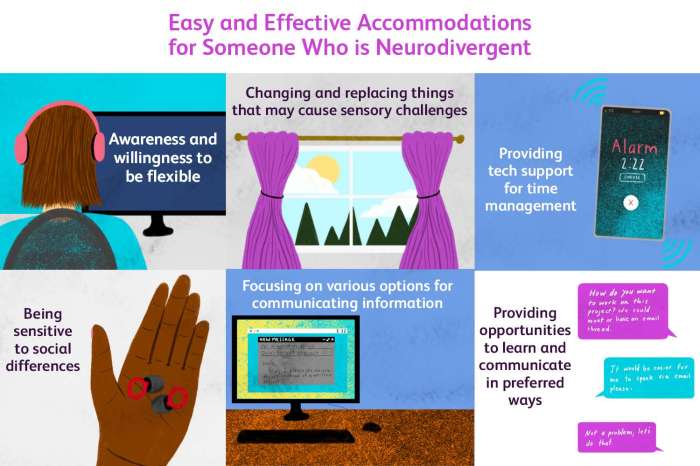App neurodivergent people navigate daily tasks – Apps: How Neurodivergent People Navigate Daily Tasks, is a topic that resonates deeply with many individuals. We often hear about the challenges neurodivergent people face, from sensory overload to executive dysfunction, but what about the tools that can help them thrive?
This blog post delves into the world of apps designed specifically to empower neurodivergent individuals, providing a glimpse into the innovative ways technology can support daily life.
Imagine a world where reminders pop up at just the right moment, helping you stay on track with your to-do list. Or a calming app that offers sensory input to manage anxiety. These are just a few examples of how technology can be a game-changer for neurodivergent individuals, offering a sense of control and empowerment in their daily routines.
Challenges Neurodivergent People Face in Daily Tasks

Navigating the complexities of daily life can be a significant challenge for neurodivergent individuals. While everyone faces their own unique set of obstacles, neurodivergent individuals often encounter specific difficulties due to their differently wired brains. These challenges can range from sensory overload to difficulties with executive functioning, impacting their ability to manage daily tasks and routines.
Sensory Overload
Sensory overload is a common experience for neurodivergent individuals, particularly those with autism and sensory processing disorder. Sensory overload occurs when the brain is overwhelmed by sensory input, such as loud noises, bright lights, or strong smells. This can lead to feelings of anxiety, stress, and even physical discomfort.
- Difficulties with concentration and focus:Sensory overload can make it difficult to concentrate on tasks, as the brain is constantly trying to process and filter out extraneous sensory information.
- Increased anxiety and stress:The constant barrage of sensory input can trigger anxiety and stress, making it difficult to relax and unwind.
- Physical discomfort:Sensory overload can manifest as physical symptoms such as headaches, nausea, and fatigue.
Executive Dysfunction
Executive dysfunction refers to difficulties with cognitive processes that control behavior, such as planning, organizing, and time management. Individuals with ADHD, autism, and other neurodivergent conditions often experience executive dysfunction.
- Difficulty with time management:Struggling to manage time effectively can lead to missed deadlines, procrastination, and feeling overwhelmed by tasks.
- Problems with organization and planning:Difficulty with organization can manifest as a cluttered workspace, lost items, and difficulty following instructions.
- Challenges with initiating and completing tasks:Executive dysfunction can make it difficult to start tasks, stay motivated, and complete them in a timely manner.
Social Communication Differences
Social communication differences are common among neurodivergent individuals, especially those with autism. These differences can affect their ability to understand and respond to social cues, leading to misunderstandings and difficulties in social situations.
- Difficulties with interpreting nonverbal cues:Neurodivergent individuals may struggle to understand facial expressions, body language, and tone of voice, which can lead to misinterpretations and social awkwardness.
- Challenges with initiating and maintaining conversations:Individuals may find it difficult to start conversations, maintain eye contact, and engage in reciprocal conversation.
- Difficulties with social reciprocity:Social reciprocity refers to the ability to understand and respond to the emotions and needs of others. Individuals with social communication differences may struggle to pick up on social cues and respond appropriately.
Strategies for Navigating Daily Tasks
Living with neurodiversity often presents unique challenges when it comes to managing daily tasks. While these challenges can be real, they are not insurmountable. By adopting effective strategies and tools, neurodivergent individuals can develop a sense of control and confidence in their daily routines.
Time Management Techniques
Time management is a crucial skill for everyone, but it can be particularly challenging for neurodivergent individuals who may experience difficulty with executive functioning, planning, and prioritizing tasks. Here are some effective strategies for managing time:
- Break down large tasks into smaller, manageable steps:This strategy can make overwhelming tasks feel less daunting. For example, instead of thinking about cleaning the entire house, focus on cleaning one room at a time.
- Use a visual timer:Visual timers can provide a clear indication of how much time is left for a task, which can be helpful for individuals who struggle with time perception.
- Set realistic goals:It’s important to set achievable goals that align with your abilities and energy levels. Avoid overcommitting and setting yourself up for failure.
- Prioritize tasks:Use a system like the Eisenhower Matrix (urgent/important) to help you focus on the most critical tasks first.
- Schedule breaks:Regular breaks throughout the day can help to prevent burnout and maintain focus. These breaks can be used for physical activity, sensory input, or simply relaxing.
Organization Tools and Techniques, App neurodivergent people navigate daily tasks
Organization is another key aspect of navigating daily tasks effectively. Neurodivergent individuals may benefit from using various tools and techniques to maintain order and structure in their lives.
When investigating detailed guidance, check out authors want ai ghostwriters now.
| Tool/Technique | Description | Benefits |
|---|---|---|
| Visual Aids | Color-coded calendars, mind maps, and visual schedules can help to organize information and make it easier to process. | Improve visual memory, enhance understanding, and reduce cognitive overload. |
| Checklists | Checklists provide a structured way to track progress and ensure that all necessary steps are completed. | Reduce anxiety, improve focus, and increase accountability. |
| Time Management Apps | Apps like Google Calendar, Todoist, and Asana can help to manage tasks, schedule appointments, and set reminders. | Improve time management, enhance productivity, and reduce stress. |
| Note-Taking Apps | Apps like Evernote and OneNote allow for organizing notes, ideas, and information in a digital format. | Promote efficient note-taking, streamline information organization, and improve accessibility. |
Personalized Routines
Establishing consistent routines can provide structure and predictability, which can be particularly beneficial for neurodivergent individuals who may thrive on routine and consistency.
- Create a daily schedule:A predictable schedule can help to reduce anxiety and improve overall well-being. Include time for work, leisure, and self-care activities.
- Use visual cues:Visual reminders can help to reinforce routines and ensure that tasks are completed on time.
- Be flexible:It’s important to be adaptable and make adjustments to your routine as needed. Life is unpredictable, and sometimes plans need to change.
Sensory Breaks
Sensory breaks can be a valuable tool for managing sensory overload, which is a common experience for neurodivergent individuals. These breaks can help to regulate sensory input and reduce stress.
- Identify your sensory triggers:Pay attention to what sensory inputs cause you to feel overwhelmed or stressed. This will help you identify the types of sensory breaks that will be most effective.
- Create a sensory toolkit:Gather items that provide calming or stimulating sensory input, such as fidget toys, weighted blankets, or aromatherapy oils.
- Take regular breaks:Schedule time for sensory breaks throughout the day, especially when you feel overwhelmed or stressed.
Seeking Support
It’s important to remember that you are not alone in your journey. There are many resources available to support neurodivergent individuals in navigating daily tasks.
- Talk to your doctor:Your doctor can provide guidance and referrals to therapists, support groups, and other resources.
- Connect with others:Join online forums or support groups where you can connect with other neurodivergent individuals and share your experiences.
- Seek professional help:A therapist or counselor can provide support and strategies for managing challenges related to neurodiversity.
Technology and Neurodiversity
Technology has become an indispensable tool for navigating the complexities of modern life, and for neurodivergent individuals, it can be a powerful ally in managing daily tasks and enhancing their overall well-being. The accessibility features and personalized settings offered by many technological tools can help address the unique challenges faced by neurodivergent individuals, fostering greater independence, inclusion, and quality of life.
Technology for Time Management
Effective time management is often a struggle for neurodivergent individuals due to challenges with executive functioning, such as planning, prioritizing, and organizing tasks. Technology can provide valuable support in this area.
- Time management apps:These apps, such as Todoist, Trello, and Asana, allow users to create to-do lists, set reminders, and track progress on tasks. They often offer features like task prioritization, project management, and visual representations of schedules, which can be particularly helpful for individuals with visual processing strengths.
- Calendar apps:Apps like Google Calendarand Outlook Calendarcan help neurodivergent individuals stay organized and on track with appointments, deadlines, and other important events. The ability to set recurring events, color-code entries, and receive timely notifications can significantly improve time management.
- Pomodoro Technique Apps:Apps that implement the Pomodoro Technique, such as Focus To-Doand Forest, can be effective in breaking down tasks into manageable chunks and promoting focus and productivity. These apps use timers to alternate between work periods and short breaks, helping individuals stay on track and avoid burnout.
Technology for Communication
Communication can be challenging for neurodivergent individuals, who may experience difficulties with social cues, verbal processing, or sensory sensitivities. Technology offers a range of tools to enhance communication and minimize these challenges.
- Text-based communication:Messaging apps like WhatsApp, Messenger, and Telegramallow for asynchronous communication, providing neurodivergent individuals with time to process information and formulate responses. They also offer features like emoji and GIFs, which can aid in conveying emotions and reducing ambiguity.
- Assistive communication apps:Apps like Proloquo2Goand Avazcan be helpful for individuals with speech impairments or difficulties expressing themselves verbally. These apps provide a visual interface with symbols, pictures, and text that users can tap or swipe to communicate their thoughts and needs.
- Social media platforms:While social media can be overwhelming for some, it can also be a valuable tool for neurodivergent individuals to connect with others who share similar experiences and perspectives. Platforms like Twitterand Facebookoffer opportunities for online communities and support groups.
Technology for Sensory Regulation
Sensory sensitivities are common among neurodivergent individuals, and technology can be used to create a more comfortable and stimulating environment.
- Noise-canceling headphones:These headphones can block out distracting noises and create a more calming and focused environment for individuals who are sensitive to auditory stimuli.
- White noise apps:Apps like Calmand Sleep Soundsoffer a variety of white noise and ambient sounds, which can help mask distracting sounds and create a more relaxing atmosphere.
- Light therapy apps:Apps like Daylightand Blue Light Filtercan help regulate sleep patterns and reduce eye strain by adjusting the color temperature of screens to mimic natural light.
Assistive Technology for Specific Neurodivergent Conditions
Assistive technology plays a crucial role in empowering neurodivergent individuals to participate fully in society. The following table provides examples of assistive technology that can be beneficial for individuals with specific neurodivergent conditions:
| Neurodivergent Condition | Assistive Technology Examples |
|---|---|
| Autism Spectrum Disorder (ASD) | Visual schedules, social stories, communication apps (e.g., Proloquo2Go), sensory toys, noise-canceling headphones |
| Attention-Deficit/Hyperactivity Disorder (ADHD) | Time management apps (e.g., Todoist), task organizers, reminders, noise-canceling headphones, fidget toys |
| Dyslexia | Text-to-speech software, screen readers, word prediction software, dyslexia-friendly fonts |
| Tourette Syndrome | Stress management apps, relaxation techniques, fidget toys, sensory tools |
Importance of Understanding and Acceptance

Understanding and accepting neurodiversity is crucial for building an inclusive society that values and supports all individuals. When we acknowledge and embrace the unique ways people think, learn, and interact with the world, we create a more equitable and just environment for everyone.
Societal Attitudes and Misconceptions
Negative societal attitudes and misconceptions about neurodiversity can have a profound impact on the lives of neurodivergent individuals. These attitudes can lead to discrimination, prejudice, and a lack of access to essential resources and opportunities. For instance, individuals with autism spectrum disorder may face challenges in social situations, leading to social isolation and feelings of inadequacy.
“Neurodiversity is not a disease or a deficit; it is a different way of being, thinking, and experiencing the world.”
- Stigma and Stereotypes: Negative stereotypes and misconceptions about neurodivergent individuals can create a climate of fear and misunderstanding, leading to social exclusion and discrimination.
- Lack of Awareness and Understanding: A lack of awareness and understanding about neurodiversity can result in misdiagnosis, inappropriate interventions, and limited access to support services.
- Accessibility Barriers: Physical and social environments often fail to accommodate the needs of neurodivergent individuals, creating barriers to participation and inclusion.
Organizations and Initiatives Promoting Awareness and Acceptance
Numerous organizations and initiatives are working tirelessly to promote awareness and acceptance of neurodiversity. These efforts aim to challenge negative stereotypes, educate the public, and advocate for the rights and inclusion of neurodivergent individuals.
- Autism Speaks: This organization is dedicated to promoting autism awareness and supporting individuals and families affected by autism spectrum disorder. They fund research, advocate for policy changes, and provide resources for individuals and families.
- The National Autistic Society: The National Autistic Society in the UK is a leading charity that supports autistic people and their families. They provide information, advice, and advocacy services, and work to challenge negative stereotypes and promote understanding.
- The Neurodiversity Movement: The neurodiversity movement is a social justice movement that advocates for the recognition and acceptance of neurodiversity as a natural variation in human cognition and experience.
The Role of Self-Advocacy and Support: App Neurodivergent People Navigate Daily Tasks

Self-advocacy is a crucial skill for neurodivergent individuals, empowering them to navigate the complexities of daily life and access the resources they need to thrive. By understanding their unique needs and effectively communicating them, neurodivergent individuals can create environments that foster their well-being and success.
Strategies for Communicating Needs and Advocating for Accommodations
Communicating needs effectively is essential for self-advocacy. Here are some strategies:
- Clearly and concisely explain your needs.Be specific about the challenges you face and the support you require. For example, if you struggle with sensory overload, explain how loud noises or bright lights impact you and request accommodations like noise-canceling headphones or a quiet workspace.
- Use visual aids or written materials.Some neurodivergent individuals may find it helpful to use visual aids like diagrams or charts to explain their needs. Written summaries can also be useful for providing clear and concise information.
- Practice assertive communication.Assertiveness involves expressing your needs and boundaries respectfully while advocating for yourself. Practice saying “no” to requests that are overwhelming or uncomfortable.
- Document your needs and accommodations.Keep a record of your accommodations, the reasons for them, and the impact they have on your ability to function. This documentation can be helpful when seeking support from employers, educators, or healthcare providers.
The Importance of Seeking Support
Building a support network is crucial for neurodivergent individuals. This network can provide emotional support, practical assistance, and advocacy.
- Family and friends:Share your experiences with loved ones and educate them about neurodiversity. Encourage them to be understanding and supportive of your needs.
- Professionals:Seek guidance from therapists, counselors, or support groups specializing in neurodiversity. They can provide valuable resources, strategies, and a safe space to process challenges.
- Advocacy organizations:Connect with organizations that advocate for the rights and needs of neurodivergent individuals. These organizations can provide information, resources, and support for navigating various aspects of life.


